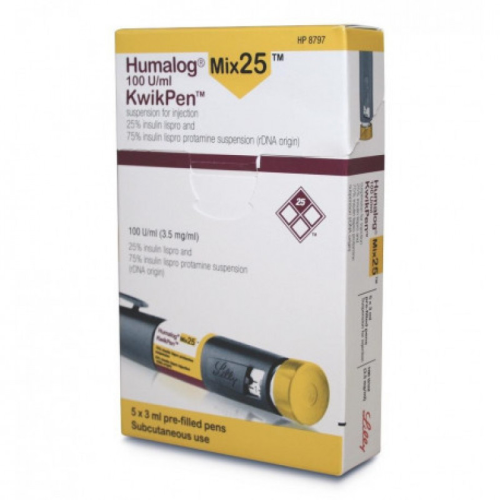Humalog Kwikpen Mix 25
- Brand: Lilly
- Product Code: Humalog Kwikpen Mix 25
- Availability: In Stock
-
$130.00
CLASSIFICATION
Hormone and Synthetic Substitute / Antidiabetic Agent
ACNE
No
WATER RETENTION
No
HBR
No
HEPATOTOXICITY
No
AROMATIZATION
No
MANUFACTURER
Lilly
WAREHOUSE
International Warehouse 2
SUBSTANCE
Insulin Lispro
,
Insulin Lispro Protamine Suspension
,
Insulin is a crucial anabolic hormone produced by all humans, playing a vital role in maintaining a healthy bodily function. While it is generated naturally, individuals with diabetes often require external insulin administration. Additionally, some athletes use insulin to promote lean muscle growth; however, its off-label use can pose serious risks and should be approached with extreme caution.
Endogenous insulin has been available since the 1920s, originally derived from the pancreases of dogs, cattle, and pigs, rather than being synthetically created. Despite concerns about its purity, exogenous insulin was celebrated for saving countless lives, as untreated diabetes can lead to death. By the 1970s, the purity of insulin improved, culminating in Ciba's launching of the first synthetic insulin in 1975. In 1982, Humulin-R was introduced, marking a perfected recreation of human insulin approved by the FDA.
Insulin Functions & Characteristics:Insulin, classified as a peptide hormone, is secreted by the pancreas and is responsible for regulating glucose, amino acids, and fatty acids in the body. It also helps prevent the breakdown of glycogen, fat, and protein.
Diabetic patients may have either Type I or Type II diabetes, both requiring insulin. Type I diabetes typically stems from an inability to produce sufficient insulin, while Type II diabetes occurs when the body does produce insulin but cannot utilize it effectively, often linked to obesity.
As a peptide hormone, insulin positively influences the liver's conversion of glycogen to glucose, while also inhibiting the conversion of non-carbohydrates into glucose. Insulin aids in glucose absorption by cells, effectively supporting muscle growth. Elevated insulin levels correlate with improved protein synthesis and can significantly enhance bone density as well as stimulate the production of Insulin-Like Growth Factor-1 (IGF-1), another anabolic hormone closely related to insulin.
Insulin also plays a role in increasing levels of Luteinizing Hormone (LH) and Follicle Stimulating Hormone (FSH), which can lead to elevated testosterone production, albeit the effect is minimal.
Effects of Insulin:Regardless of diabetes type, insulin primarily functions to regulate blood sugar levels. Its strong anabolic and anti-catabolic properties can also benefit athletes; nonetheless, using exogenous insulin off-label can lead to substantial fat gain and even fatal outcomes without proper guidance.
Athletes leveraging insulin for its anabolic benefits must carefully manage body fat, as high insulin levels can impede fat-burning capabilities. To minimize metabolic disturbances while maximizing anabolic effects, athletes are advised to inject insulin shortly after intense weight training, accompanied by a meal.
The careful management of diet is crucial for insulin supplementation to ensure that glucose and proteins are redirected to muscle rather than fat. Typically, when used in a performance context, the ideal timing for insulin administration is immediately post-workout, alongside food intake.
When used correctly, insulin can facilitate the development of lean muscle mass in a short timeframe. Although managing potential fat gain can be challenging, it is achievable with the right strategy. Athletes often combine insulin use with anabolic steroids and Human Growth Hormone (HGH) for enhanced results, which also aids in body fat control.
Side Effects of Insulin:Insulin use carries potential side effects, primarily hypoglycemia. For diabetic individuals, hypoglycemia can usually be managed with careful dosing, but for athletes, it poses significant risks. The fall in blood sugar levels can have severe consequences, including death.
Hypoglycemia, where blood glucose levels drop dangerously low, is the most common adverse effect associated with insulin. Symptoms can include dizziness, hunger, fatigue, blurred vision, mood changes, and unsteady movements.
If symptoms of hypoglycemia arise, individuals should immediately consume fast-acting carbohydrates, such as candy or sugary drinks. It's crucial to avoid sleeping after taking insulin without addressing symptoms, as this could lead to a life-threatening situation. Always have someone present during insulin administration to ensure safety.
Severe hypoglycemia, while often manageable, can lead to life-threatening conditions such as diabetic coma. Deaths related to recreational insulin use have occurred, underscoring the gravity of this risk.
In addition to hypoglycemia, allergic reactions can occur, although they are rare. Symptoms at the injection site may include swelling or irritation, and more severe reactions may involve wheezing or a sudden drop in blood pressure, necessitating immediate medical help.
Another side effect involves localized fat accumulation, which can happen if insulin is injected repeatedly in the same area. To mitigate this, users should alternate injection sites.
Insulin Administration:For diabetes management, dosing varies based on individual needs, with no standardized dosage applicable to everyone.
In performance contexts, the availability of various insulin types complicates dosing strategies. Fast-acting insulins like Humulin-R, Humalog, and Novolog are often preferred. Humalog acts quickly, showing effects within about 15 minutes, while Novolog and Humulin-R take slightly longer to peak.
Common performance enhancement dosages typically start at 1 IU per 10 pounds of body weight, but novice users should begin with lower doses, gradually increasing until they find a comfortable range without experiencing hypoglycemic symptoms.
The optimal time for insulin administration is immediately after weight training, accompanied by at least 100 grams of carbohydrates and 40-50 grams of protein.
It is essential for insulin users to keep fast-acting carbohydrates within reach during their post-injection activities to counteract potential hypoglycemia. Regardless of whether symptoms are present, consuming a meal soon after the insulin injection is advisable.
Insulin Reflections:Insulin is an essential hormone for health and physical function. While it can aid muscle growth, it carries significant risks and challenges, particularly in fat management. Most individuals do not require insulin for performance objectives and will likely benefit more from avoiding its use.
Nevertheless, it remains popular among certain athletes, especially within competitive bodybuilding, where rigorous control of diet and careful planning can mitigate some associated risks. Note that some athletes who prioritize performance over aesthetics may also utilize insulin, being aware that it is not detectable in drug tests.

